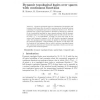115 search results - page 12 / 23 » On contraction and the modal fragment |
TIME
2009
IEEE
14 years 3 months ago
2009
IEEE
The model checking problem for CTL is known to be P-complete (Clarke, Emerson, and Sistla (1986), see Schnoebelen (2002)). We consider fragments of CTL obtained by restricting the...
AGENTCL
2000
Springer
14 years 6 days ago
2000
Springer
The process of cooperative problem solving can be divided into four stages. First, finding potential team members, then forming a team followed by constructing a plan for that tea...
FSEN
2009
Springer
14 years 1 months ago
2009
Springer
Although presented with a variety of ‘flavours’, the notion of an interactor, as an abstract characterisation of an interactive component, is well-known in the area of formal ...
TABLEAUX
1999
Springer
14 years 25 days ago
1999
Springer
Hybrid logics were proposed in 15 as a way of boosting the expressivity of modal logics via a novel mechanism: adding labels for states in Kripke models and viewing these labels as...
AIML
2006
13 years 10 months ago
2006
Dynamic topological logics are combinations of topological and temporal modal logics that are used for reasoning about dynamical systems consisting of a topological space and a con...

